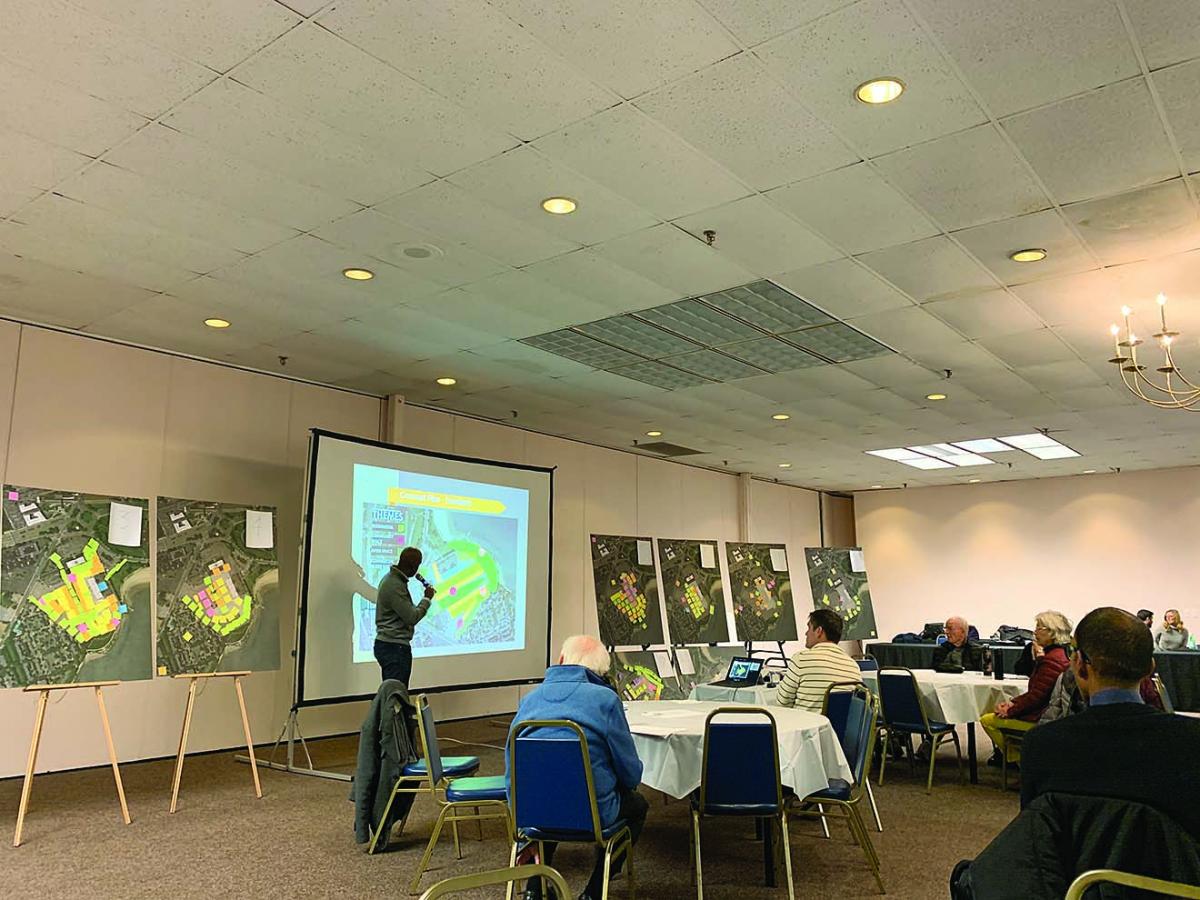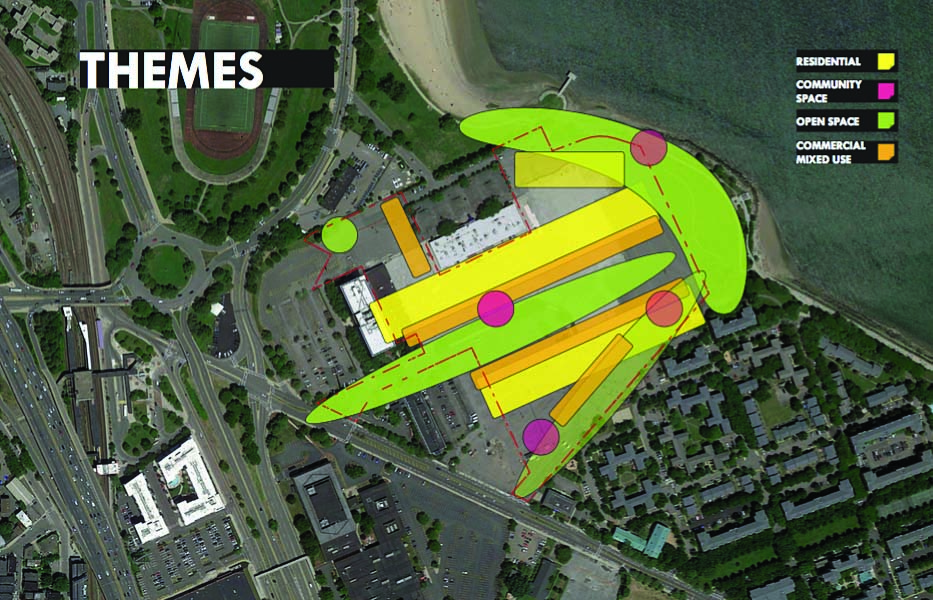November 21, 2019
During a three-hour-long huddle with civic leaders on Columbia Point last Saturday, Accordia Partners outlined their preliminary ideas for the redevelopment of the 20-acre Bayside property that they have agreed to lease from the UMass Building Authority (UBA).
Branded as a visioning session organized by four Dorchester civic groups – Columbia/Savin Hill, Harbor Point, Andrew Square, and McCormack (Polish Triangle) – the session was the second this fall meant to keep neighborhood stakeholders up to date on Accordia’s plans for the prime waterfront site.
Last spring, the development team entered into a long-term lease arrangement with the UMass Building Authority that will yield the university between $192.5 million and $235 million for a 99-year term, according to public records acquired by the Reporter in August. UMass paid $18.7 million to acquire the former exposition center in 2009.
The close to 100 participants at Saturday’s meeting were given a summary of the input gleaned from the first meeting in September via a “concept” map that outlined general neighborhood concerns, including housing affordability, open space, climate resilience, diversity, connectivity, and traffic.
Accordia’s Kevin Galvin talked about the site constraints that the company is facing as it looks to build out the site – height restrictions and Chapter 91, the law that regulates any waterfront development with respect to public access.
Height restrictions limit the building to roughly 350-375 feet, which Accordia “won’t be hitting,” according to Galvin. Instead the developers envision staggering building heights, with those closest to the waterfront much lower than what’s allowed, and varying heights coming back from the water.

Gregory Minott of DREAM Collaborative LLC goes over slides.
Chapter 91, said Galvin, “is probably the biggest ticket item that constrains what we can build.” Regulations under this law also speak to height restrictions and ample amounts of open space near the water.
“Half of all this shaded area [on the “concept map”] is required to be open space,” he said. “That includes green space, sidewalks, streets, and playgrounds. Chapter 91 also mandates that 75 percent of the ground space be open to the public, whether that’s restaurants, meeting space, or civic space. Part of these discussions is what people would like to see in that public space.”
Michael Joroff, senior principal of JVA LLC, a global planning and urban management consultancy hired by Accordia, went over the themes that have been identified as community priorities for the Bayside development. He then asked attendees to be more specific about the kind of uses they’d like to see. Replies included things like libraries, day care centers, playgrounds and ball fields, as well as community health centers and an outdoor amphitheater.
Some area residents brought up serious concerns over how the project would alleviate displacement in Dorchester, rather than add to it.
Mary Jo Connelly, a researcher and organizer at UMass Boston’s Professional Staff Union, said: “I think this is exciting and it’s going to be a wonderful community and a place to live. The question I have is who is going to get to enjoy this community? I really would like to see a little more consideration [for] how this could be a place where people that are being displaced from South Boston and Dorchester or other parts of the city could get to live. I live in a place that’s got great vision and it’s going to be a cool place to live, but all of the people who used to live there — all of the working people and various populations of ethnic groups— are out.”
Kathy Rogers, a longtime Columbia Point resident, echoed Connelly’s sentiment while providing some historical context to the discussion.
“I grew up in the Columbia Point housing projects, and after the marshlands, this site was a place where they dumped building materials. I used to have to climb over [steel] rebar in order to get to the beach, so I know what goes on here,” she said. “I know the history. I know UMass promised a lot of access to Columbia Point residents and what we got was an eight-foot chain-link fence with three strands of barbed wire.”
She added: “So, forgive me if I don’t trust everything that’s being said here, because what we’re promised and what we get are not necessarily the same.”
Some participants pushed the discussion toward community benefits that likely would come out of not only the Bayside property, but also from other nearby developments.
“I’ve never seen the amount of community benefits that are potentially before us, it’s unbelievable,” said longtime Savin Hill resident Don Walsh, who is spearheading a new committee called the Columbia Savin Hill Community Benefits group.
“Accordia has put $25 million on the table,” he said. “There’s a lot of other development going on; it could be another $25 million. What are we going to do with that? How are we going to address and respond to whatever amount we’ll have?” he asked.

A rendering shows compiled themes collected at the last visioning meeting.
UMass Professor Kenneth M. Reardon said his peers have been “very impressed by the attention that’s being given to the fragile nature of shorefront property. The other thing that keeps coming up is the potential of the project, if it’s built at this scale, to transform rents and be an accelerator of gentrification and displacement.”
He asked, “Will there be the same kind of due diligence to look at the socio-economic impact of building mostly market rate in this region on the current and most vulnerable people?”
In a response, Kirk Sykes, an Accordia Partners principal, said, “We want to create a place that isn’t overwhelmed by any one type of housing, or one type of person. That’s not the place that Dorchester is and that’s not what we want. We’re looking for that diversity. We will find a way to get the best and the brightest insights as we go into analysis of how we think about the housing makeup. It’s a great suggestion; let us take it into consideration.”
In terms of branding the development, Daren Bascome, of Proverb LLC, asked for community input. Many residents said its should be connected to Dorchester, like having the destination in the name.
“Language is so important and it sounds like one of the tensions in the room is that there’s not a new community that’s being created but rather a new space for the community,” said former UMass Professor Aaron Devine. “I think the language should reflect that we’re creating a new space, and maybe even put neighbors first.”
Councillor Frank Baker said that he wants to see the project reflect its location. “I think after living here and listening to people tell us for the previous 40 years that we lived in a shithole, for lack of a better term, it’s our time to put Dorchester in that branding,” he said.
Accordia Partners plans to present formal plans to the community and then file a letter of intent with the Boston Planning and Development Agency (BPDA) by January. The company hopes to have all necessary permits in hand to begin construction by the third or fourth quarter of 2021.


